The Pirate (大海盜) (1973)
When one thinks of Pirates, the mind jumps to Johnny Depp in the film series, Pirates of the Caribbean (2003-2017), or Peter Pan’s Captain Hook. However, Chang Cheh, Pao Hsuh-Li, and Wu Ma’s The Pirate (大海盜) (1973) is a cinematic voyage where the western fairy tale Robin Hood meets pirates. This film has all the classic trademarks of Chang, especially with the inclusion of actors Ti Lung and David Chieng. Although the film centers around pirates, it is less so about piracy and thieving but aims to address several issues such as greed and morality.
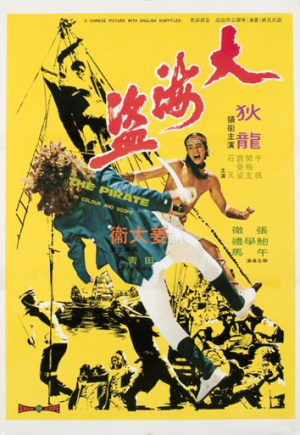
Image Source: Celestial Pictures Limited
Plot Summary
Towards the end of the Qing Dynasty, pirates swarm the South China Sea; attacking merchant ships. After invading a Portuguese merchant ship, the pirates are overwhelmed with the amount of gold and jewels they gathered. However, the honorable leader of the gang, Chang Pao-Chai, plans to use the groups’ earnings to help the neighboring town’s struggling fishermen. Along the way, Chang Pao-Chai hides his pirate identity to avoid arrest from officials such as General Wu.
A Breakdown of the Characters
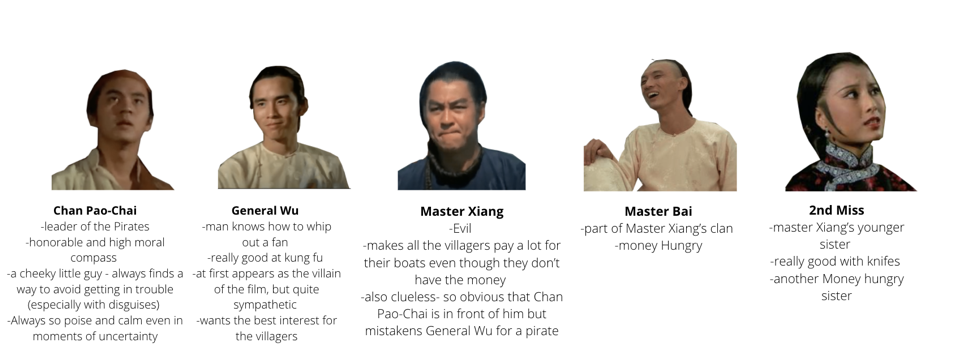
Who are the Directors?
Although Chang Cheh is associated with this film, this project was a collaboration with his two mentees: Pao Hsuh-Li and Wu Ma. Pao grew up in Nanking in the late 1930s but soon relocated to Taiwan. While he was in high school, he worked at a film studio’s printing division. After his time at the printing division, he was promoted to an assistant cameraman and carried this title for six years. In the early ‘60s, he joined Lucky Star Film as a cinematographer and helped Hong Kong director Lo Chen’s film, Too Late for Love (烽火萬里情) (1967). The commercial success of the film led to Pao’s work with Shaw Brothers Studio. During his time at the studio he mainly worked with Chang Cheh on projects such as The Trail of the Broken Blade (斷腸劍) (1967) and Golden Swallow (金燕子) (1968). It was only until the 70s, did Pao take directorial reign over projects. After his time at Shaw he made his way back home to Taiwan and directed a wide range of Wuxia films for Yen Sheng Film. By the ‘80s, Pao and his screenwriter wife, Katy Chin Shu-Mei, formed their own studio, Yu Fiung Film Company. Together they directed and produced a number of films.
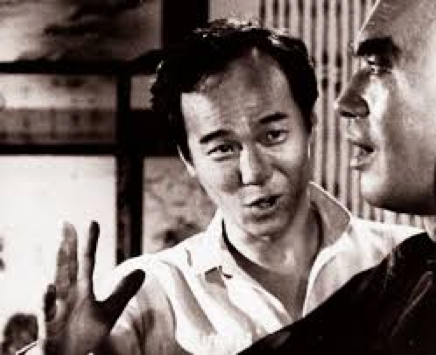
Image Source: http://www.hkfilmdirectors.com/zh-hk/director/pao-hsueh-li
Wu Ma, also known as Fung Wang-Yuen, was a Hong Kong actor, producer, writer, and director. Wu was exposed to the film industry at a young age. Although he immigrated to Hong Kong and became a machinist, he enrolled in an acting course and soon became a contract player for Shaw Brother’s Studio. He made his screen debut in 1964 with the film, Lady General Hua Mulan (花木蘭). In the 1970s Wu made his directorial debut with the Wrath of the Sword (怒劍狂刀) (1970) and worked on many projects with Pao Hsuh-Li and his mentor Chang Cheh. Sadly, after the wuxia and martial art films hype died down in Hong Kong, Wu turned back to acting. He appeared in a total of 312 films throughout the ‘60s till the late 2010s.
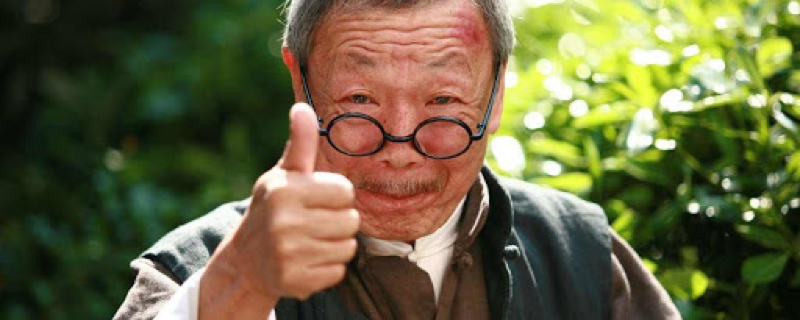
Image Source: http://m.tianya999.com/question/2018/1204/17265649.html
What makes this Chang Cheh film different?
Coincidentally, this is the third Chang Cheh film in this Martial Art program. However, there are distinguishable differences between this film compared to his others. As mentioned before, this film is a collaboration between Chang Cheh, Pao Hsuh-Li, and Wu Ma. There is no doubt Pao and Wu take note of Chang Cheh’s trademarks such as the emphasis on fighting scenes. However, a noticeable difference between The Pirates (大海盜) (1973) and the earlier two films is the staging of the fighting scenes. Chang often used narration and dialogue as a bridge for the fighting scenes. However, this film does not deliver this recognizable Chang trademark. Instead, viewers are presented with two prolonged fighting scenes back to back. At first, it is ingenious of the directors to set the fighting scenes on a beach. Viewers are spell-bound by the choreographed action on land, but when the characters Chang Pao-Chai and Master Xiang fight in the water it’s invigorating, as it was never done before in Hong Kong’s film industry. Pao and Wu’s fighting scenes highlight the ability experimentation has in offering audience members a refreshing perspective on martial arts. It shows that these action-packed films can be dramatized and be blockbuster sensations without the gore.
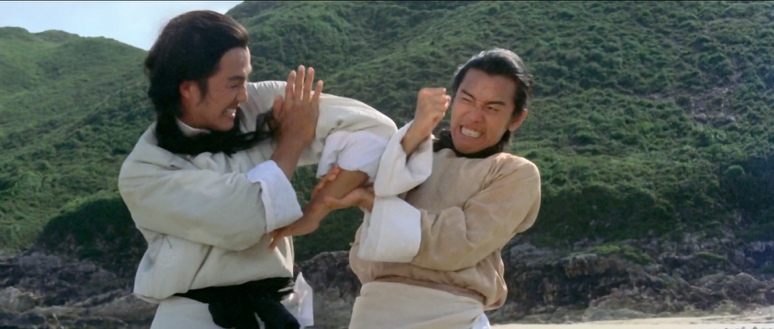
Image Source: Celestial Pictures Limited
Gender Roles in the Pirates
Out of all of Chang’s films, we have showcased on this webpage, this film encompasses the idealization of masculinity. Chang was well-known for advocating male actors as the protagonist of his films. In The Pirate (大海盜) (1973), the character Chang Pao-Chai is portrayed as an ideal man. Although he is known as a pirate, a bandit on the run, he uses his own treasures to help those in need. This is most evident in the powerful scene, where he saves a little girl who was almost sold by her father. Chang Pao-Chai does not need to interfere, but his moral compass tells him the opposite. His benevolent behavior is also seen towards the end of the film, as he steals silver from the rich masters and pays off the debt of the fishermen. Chang’s actions reflect society’s values and expectations that the man will always come to society’s rescue. This also addresses a much more significant ideal, which is the power of films. With films like The Pirate (大海盜) (1973) it projects this idealization of males and heightens the expectations that men have to act a certain way.
Addressing the Theme of Greed
Chang’s films are well-known for addressing underlying societal issues. Chang, Pao ,and Wu collectively work together to produce a film that hints at the power and effects of greed. Throughout the film, viewers witness the struggles villagers deal with while the masters thrive off the debt of the fishermen. Viewers observe how power and money-hungry people go to dire lengths to maintain their wealth. The timing of this film is perfect, as the theme of greed parallels events that were happening in the ‘70s, such as the 1973-74 Stock Market Crash. After the Great Depression of 1929, the 1973-74 Stock Market Crash was considered one of the worst stock market downturns. The crash deeply affected the United Kingdom, but Hong Kong was also hurt as the Hang Seng Index fell from 1,800 to almost 300 in 1973. The trio used film to confront a heavy issue in a light-hearted manner. It shows how money and greed can lead to other issues such as corruption. Instead, members of society should act like the character Chang-Pao Chai, a selfless man who thinks about how his actions affect the community, not himself.
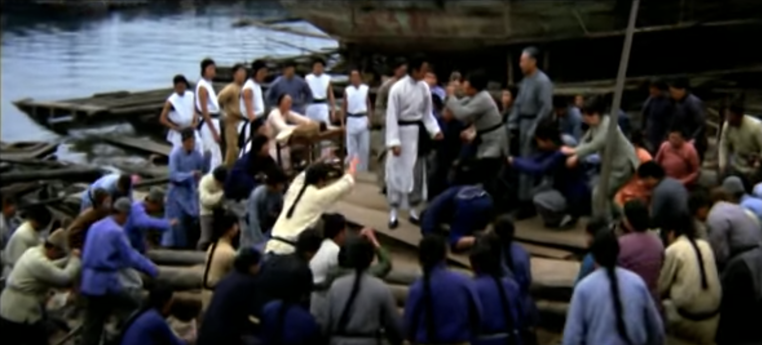
Image Source: Celestial Pictures Limited
By Ariana Heffner
Film footage supplied by Celestial Pictures Limited / 電影片段由天映娛樂有限公司提供
